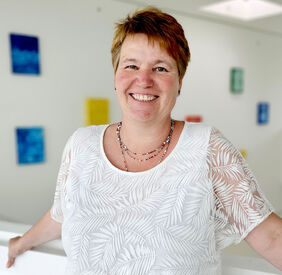Jena. Ivonne Görlich is celebrating her 25th anniversary at the Leibniz Institute on Aging - Fritz Lipmann Institute (FLI) Jena. We took this as an opportunity to talk to her about her job and everyday working life.
Born in Jena, she had already completed an internship at the FLI during her training as a medical-technical assistant (MTA), back then in Göschwitz when the FLI was still called IMB (Institute of Molecular Biotechnology). Here Ivonne Görlich was able to work on the international Human Genome Project. Twenty research institutes worldwide were involved in this project to analyze the human genome - including today's Leibniz Institute on Aging - Fritz Lipmann Institute (FLI). Together with colleagues from Germany and Japan, the scientists celebrated a huge success in 2000, as they comprehensively analyzed chromosome 21, raising the prospect of one day finding therapies for trisomy 21. Five years later, the genome project involving Jena set another milestone: the researchers decoded the sex chromosome shared by men and women. This is significant because the X chromosome is particularly frequently affected by defects. Many hereditary diseases can now be researched in more detail.
If you could already work on such exciting projects during your apprenticeship, it made sense to go to a research institute. Ivonne Görlich applied to the FLI and was offered a position in genome analysis, where she supported the scientists as a technical assistant in various projects until mid-2013. She later moved to the DNA Sequencing Core Facility. Görlich is "one of the early birds in the lab", as she says herself. "As often as I can, I'm there as early as possible."
The Core Facility, a technical and service facility of the institute, supports the FLI scientists with next-generation DNA sequencing technology (NGS). This technology provides extensive sequence information from biological samples and is still shaping molecular genetic research today. External users can also gain access to this technology, e.g. as part of cooperation agreements. In addition to quality control of DNA/RNA samples, library preparation and sequencing, the facility also offers first-pass data processing, data quality control and data analysis. A number of pipelines for in-depth data analysis are also established and available.
Ivonne Görlich still enjoys her job after 25 years. "The work is varied, I have a good boss and we are a very pleasant, small team. Here at the institute, we are a large community where things are very informal." Ivonne Görlich faces challenges when new technology is added. "That's always very exciting and all the more gratifying when it works well."
When asked whether it was her plan to have and keep her work and life centered in Jena, Ivonne Görlich replies: "Not the plan. But it just worked out that way. My family is here and I'm a person who is close to home."
25 years in the service of research is nothing unusual. However, 25 years in the service of a single research institute is. We would like to thank Ivonne Görlich for her work at the FLI and wish her all the best and every success with all the projects that lie ahead for her and her colleagues.









